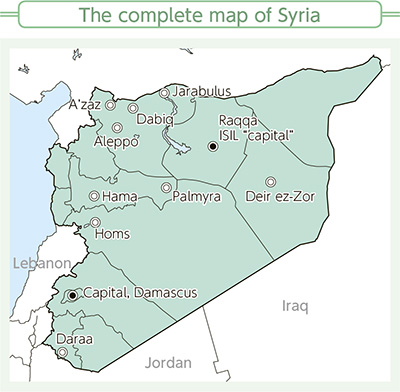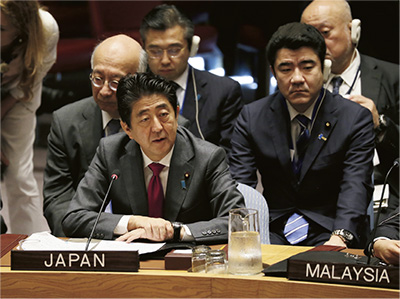Diplomatic Bluebook 2017
Chapter 2
Japan's Foreign Policy that Takes a Panoramic Perspective of the World Map
2.Syria
(1) Status in Syria
There was no sign of abatement during 2016 for the Syrian crisis that commenced in 2011. As of the end of 2016, the situation in Syria is considered to be this century's worst humanitarian crisis with more than 250,000 deaths, 4.8 million refugees, and 6.5 million internally-displaced persons. Within Syria, there has been continued violent conflict among four competing parties: the Syrian government, the moderate rebels, extremist forces including the Islamic State of Iraq and the Levant (ISIL), the Nusra Front, and Kurdish forces.
Under this situation, Syrian Government Forces who are receiving support from Russian airstrikes and other measures have intensified their attacks on the northern city of Aleppo, which had been the home of the rebels from the outset of the Syrian crisis. They virtually had control of all of Aleppo by December 15. However, the Syrian Government Forces falls far short to regain control of all of Syria, and the instability continues with ISIL reoccupying Palmyra on December 11.

Several cease-fires were attempted during 2016. Cease-fire agreements were reached between the U.S. and Russia in February and September, and combat temporarily subsided, but the agreement was breached and the battle once again intensified. In addition, a cease-fire agreement brokered by Russia and Turkey came into effect on December 30, but it is unpredictable if this cease-fire will be honored by the disputing parties or lead to a subsequent political process.
The fight against ISIL has involved ongoing airstrikes within Syrian territory by the U.S. and others, and progress has been made with the operation to liberate Mosul in Iraq. In addition, from August the Turkish Army together with the Free Syrian Army made inroads into Northern Syria. From November, the Kurdish Yekîneyên Parastina Gel (YPG) or the People's Protection Units, which makes up the core of the Syrian Democratic Forces, commenced operations towards recapturing Raqqa in Eastern Syria, which ISIL refers to as its capital. ISIL has gradually lost its power and while the area in Syria under ISIL control is gradually shrinking, conditions remain chaotic.
(2) Political Process and Test for the International Community
Intra-Syrian talks between the Syrian government and rebels commenced in January in an indirect format brokered by the UN. After a temporary suspension in February due to increased fighting, talks were held in March and April but then stalled once again. Discussion between the Syrian government and opposition groups is vital to find a political solution to the Syrian crisis, so there is an ongoing discussion including amongst the international community towards a resumption of the Intra-Syrian talks.
The activities by the International Syria Support Group (ISSG) is one of the initiatives of the international community. A meeting of the ISSG was held in October 2015, as an extension of the Summit of Foreign Ministers from the U.S., Russia, Saudi Arabia, and Turkey to include related countries and institutions, and this framework has continued in 2016. At the meeting of the ISSG in February (Munich), a statement was issued concerning humanitarian access to the conflict area, a nationwide cessation of hostilities in Syria, and the establishment of a humanitarian task force and a cease-fire task force. Furthermore, participation in the ISSG by Japan, Australia, and the Netherlands was approved. Japan participated in the May ISSG meeting (Vienna) for the first time (attended by Japan's Ambassador in charge of Syrian Affairs), and Foreign Minister Kishida attended the September ISSG meeting (New York).
There was disorder at the United Nations (UN), with the UN Security Council failing to adopt two draft resolutions from Russia and from France and Spain on October 8, but UN Security Council Resolution 2328 on protection of Aleppo civilians was adopted on December 19 and UN Security Council Resolution 2332 concerning humanitarian assistance was adopted on December 21. In addition, a UN General Assembly resolution concerning a cease-fire in Aleppo and humanitarian assistance was adopted on December 9 and a UN General Assembly resolution concerning the investigation and prosecution of those responsible for the most serious crimes in Syria was adopted by majority vote on December 21. Furthermore, UN Security Council Resolution 2336 welcoming the Syrian cease-fire agreement brokered by Russia and Turkey was unanimously adopted on December 31.
 Prime Minister Abe, attending the UN Security Council High- Level Briefing on Syria (September 21, New York, U.S.). (Photo: Cabinet Public Relations Office)
Prime Minister Abe, attending the UN Security Council High- Level Briefing on Syria (September 21, New York, U.S.). (Photo: Cabinet Public Relations Office)(3) The Japanese Government's Efforts
Japan has consistently maintained a stance that a military solution will not be found in the Syrian crisis and that a political solution is indispensable. At the same time, Japan also attaches the importance to continue support to stave off further aggravation of the humanitarian situation through ongoing assistance. From this standpoint, following the aggravated situation in Syria, Japan has provided assistance worth more than 1.66 billion US dollars to Syria and neighboring countries by the end of 2016 for humanitarian assistance. Since becoming a UN Security Council non-permanent member in 2016, Japan has actively contributed to the discussion regarding the issue at the UN Security Council, and also led the discussion at the G7 Ise-Shima Summit during Japan's presidency of the G7. Apart from this, Japan has continued to put pressure on the relevant parties in areas such as ensuring humanitarian access and cease-fires. Japan intends to continue its efforts for the improvement and stabilization of the situation surrounding Syria, mainly through humanitarian support which is Japan's strength and in close coordination together with other members of UN Security Council and the international community.
